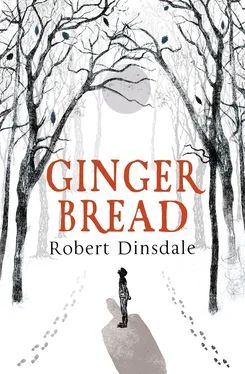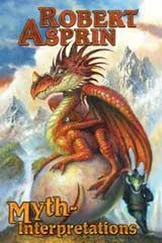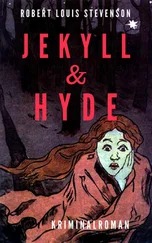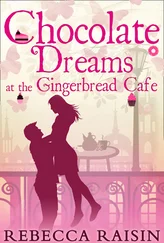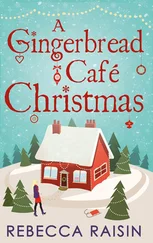‘Yes, boy?’
The boy loses his nerve. ‘It was only a story, wasn’t it?’
‘Well,’ says Grandfather, ‘there’s a little bit of truth in every fable.’
‘Even Baba Yaga eating little boys and girls?’
Grandfather pales, as white as the snow, and in that instant he really is the forest shade the boy thought sent to catch him. ‘Even that, boy,’ he whispers, dead words to kill the conversation.
Plague oaks and black pines hurtle past.
What Grandfather does when the boy is at school is a riddle he cannot solve. The boy watches the car stutter back along the road, and wonders at the yawning emptiness ahead. Turning to the schoolhouse, he thinks: we should have stayed in the forest. At least, then, papa had cattails to cook and kindling to muster. At least the trees are alive, not like the tenement walls. It must get very weary to be so very old.
It is daybreak and there are children milling in the schoolyard. He stands on the edge of them, shivering – for he has left his eiderdown in the car, and his clothes still cling to him, soaked in forest frost.
Yuri is already here, prowling the corners of the schoolyard with his head in the clouds. The boy means to go and play with him, but before he gets there the schoolyard starts flocking, up the steps and into the schoolhouse. Yuri has already gone through the doors by the time the boy gets there. He pauses, because to go through them now would be a very strange thing. He can see children milling beyond and the caretaker, a young man they say is as simple as the most insensible child, is moving his broom as if to sweep them on their way.
He steps through the doors, to a wave of dry heat, quite unlike Grandfather’s fires.
Almost instantly the caretaker’s eyes fall on him. ‘You can take off that hat.’
The boy goes to lift the bearskin from his head. Too late, he remembers the ice binding it to him. He pulls and the crystals tear at his skin.
‘Jesus, boy, what happened to your head?’
He lifts his fingers to trace the raised skin where he wore the halo. Occasionally his fingers find tiny outcrops of ice still sprouting from the blisters, but they perish and melt at his touch.
‘You little bastards don’t look after yourselves. What kind of mother sends her boy to class looking like that?’
With the bearskin hat still in his hands, he hurries down the corridor. It is only a small schoolhouse, with not even a single stair. The tiniest children are in two rooms around a bend in the hall, but everyone else is gathered in the three rooms that flank the corridor. In the middle is the library with its open walls, where you can go and choose a storybook or have injections when the nurse comes to visit. At the very end of the corridor, boys and girls are scrambling for pegs to hang their coats, and then cantering for the best seats in the assembly hall.
The boy is halfway along the corridor when Mr Navitski’s eyes fall on him. At first his brow furrows, eyebrows creeping up to meet the point of his black fur, but then his eyes soften and he has a look less like bewilderment, and more like … The boy knows this look well. It is a look of: your mama’s gone and you must be hungry.
As the rest of class scramble to sit cross-legged in the assembly hall, Mr Navitski picks a way through. ‘We all wondered when you’d be back.’
‘Am I late?’
‘No, you’re not late, but you are … Maybe you’d like to wash up before assembly?’
The boy peers through Mr Navitski’s legs, to see the headmistress already pontificating to the gathered school. ‘Will I be in trouble for missing it?’
‘No, you won’t be in trouble. Better you … Look, I’ll help.’
Mr Navitski doesn’t seem to want to take him by the hand, but takes him by the hand nonetheless. There is a little bathroom just by the assembly hall, and together they go in. The water in the taps will take forever to warm up, so Mr Navitski fills a sink with cold and lathers up a cake of hard soap.
‘How long have you been wearing this shirt?’
The boy shrugs, because something tells him he should not mention the forest.
‘We’ll find you a new one, from lost property.’
‘Can I keep this one?’
‘You mustn’t wear it to class, but we’ll keep it safe for you.’
Mr Navitski’s hand strays from the boy’s shirt to his hair, where he begins to tease out pieces of twig. When his hand brushes the blisters, the boy recoils. ‘What happened here?’
‘It was the ice.’
‘Ice?’
‘I was wearing my papa’s hat, and it iced to me.’
‘You’re in his tenement now, aren’t you? Doesn’t he have the heating turned up?’
This the boy knows not to answer.
‘When was the last time you had a proper meal?’
The boy remembers cattail mash, washed down with pine-needle tea. ‘It was last night.’
‘Really?’
‘Really.’
‘I have some leftovers my wife packed away for me. I’ll have them warmed through.’
After he has rinsed his face and hands and even his arms up to the elbows, Mr Navitski finds a brush and tugs the tangles out of his hair. By the time they are finished the assembly is over, and it is time for class.
‘You’ll have some catching up to do.’
‘I know.’
‘Come on, then. We’re learning about the war.’
‘The wars of winter?’
Uncertainly, Mr Navitski says, ‘Well, when the whole world was at war …’
‘Was it when the Winter King fought the King in the West? And there were some men who had to wear stars, and went into the forests and lived there and ate cattail roots and pine-needle tea, all so the soldiers didn’t catch them?’
A smile curls in the corner of Mr Navitski’s lips. ‘You mean the Bielskis, and people like them. They were Jewish partisans. They broke out of the ghettos and went into the wilderness, into the pushcha itself, and built a whole civilization there, and the Germans just couldn’t find them. There were Russian partisans too. They went into the pushcha and found ways to fight back. Oh,’ he beams – because some stories thrill grown men as much as little boys – ‘men were crawling all through the pushcha during the wars.’
‘When all the world was the Russias?’
‘Well, one might say that …’
‘And they might still be out there, even if they’re gone, because the trees drink them up and everything that ever died turns into trees, doesn’t it?’
This time, Mr Navitski hesitates before replying. He nods only vaguely, his brow creases again, and he shepherds the boy into class to join children who look at him differently, oddly – because, now that mama is gone, he is not really like them at all.
It turns out that the project is what our families did in the war. In turn, the boys and girls will tell about their own families, and what happened to them in that long-ago time. One girl tells how her Grandfather was a soldier and got put in a prison and had to spend the whole war there, learning ways to escape. Only, when he escaped, he found he was hundreds of miles from home and somehow had to get back. In those days there were no motor cars, and the trains were filled with wicked soldiers, so lots of people had to walk. Like those men in Grandfather’s story, they had to live wild in hedgerows and forests, and some of them looked like cavemen and others more beastly still.
Yuri’s project is a pile of crumpled notepaper and a map, like the one on his bedroom floor, which shows all the Russias and the countries along its side, places like Latvia and Lithuania , a big scribble called Ukraine and after that the tiny Belarus , coloured in with trees.
‘Aren’t you telling about your papa?’
Читать дальше
